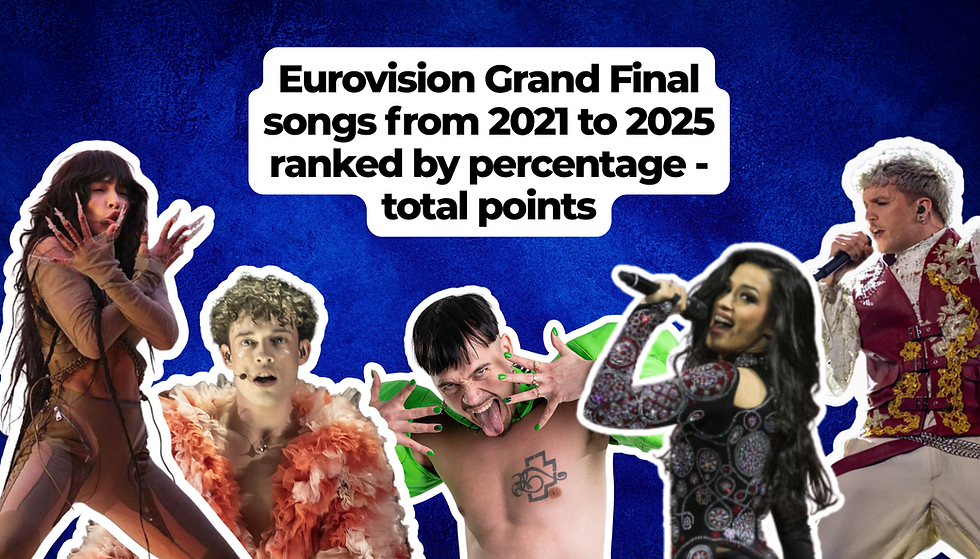Eurovision 2022: The songs by numbers
- Dale Roberts

- Mar 22, 2022
- 2 min read

Today, the full line up of 40 songs for the Eurovision Song Contest 2022 was completed.
And for those who love their stats, it's a great opportunity to see how the entries stack up to previous years by numbers.
We take a look at the statistics behind the Eurovision 2022 songs from total entries, type of act, language and song titles.
Total entries

This year sees Eurovision numbers jump back into the 40s after 2019 dipped into the 30s for the first time since 2014. The additions of Armenia and Montenegro helped get it to the magic 40 mark.
Like 2021, the line up started at 41 but we had another controversial country booted out of the contest this year, with Russia, for obvious reasons, being barred from taking part.
Artists

As most years, there is a good mix of the types of acts with female solos leading the way (15), with male solos and groups next (both 11), and duos bringing up the rear (3).

Female soloists lead over male soloists again. Only once in the previous eight years have the men been more prevalent than the women (in 2019, which was one by Duncan Laurence).

What has been interesting is the rise of group acts. There was a particularly big jump this year, the Måneskin effect it seems, but it has been rising steadily over the years.
Languages other than English

Since Salvador Sobral won in 2017 the number of entries including a language other English.
The numbers were starting to drop, so with another non-English language winner last year from Italy, we have seen yet another jump again.
Love is not forever

As the famous interval act of 2016 'Love, love, peace, peace' says, "the song is essential. Let it be about something everyone can connect to. Love works!"
Well it seems, not so much in 2022.
For the first time since 2011, there are no songs with the word "love" in the title!
And considering only two Eurovision winners have the word "love" ('Love Shine a Light', 'Fly on the Wings of Love') maybe that's not such a bad thing.
As ever, Eurovision is a spectacle of race, gender, language and lyrics that brings a totally different suite of experiences and statistical talking points every year.
Will the numbers bring us something new this year? A first win for a nation? The first duo to win since 2011? We'll have to wait until May to find out.
For continued updates on all the national finals follow us on Facebook, Twitter and Instagram, find us @aussievisionnet.



google 优化 seo技术+jingcheng-seo.com+秒收录;
Fortune Tiger Fortune Tiger;
Fortune Tiger Fortune Tiger;
Fortune Tiger Fortune Tiger;
Fortune Tiger Slots Fortune…
站群/ 站群
gamesimes gamesimes;
03topgame 03topgame
EPS Machine EPS Cutting…
EPS Machine EPS and…
EPP Machine EPP Shape…
Fortune Tiger Fortune Tiger;
EPS Machine EPS and…
betwin betwin;
777 777;
slots slots;
Fortune Tiger Fortune Tiger;
google seo google seo技术飞机TG-cheng716051;
03topgame 03topgame
Jogos JOGOS
Fortune Tiger Fortune Tiger;
Fortune Tiger Slots Fortune Tiger…
Fortune Tiger Fortune Tiger;
EPS машины EPS машины;
Fortune Tiger Fortune Tiger;
EPS Machine EPS Cutting Machine;
EPS Machine EPS and EPP…
EPP Machine EPP Shape Moulding…
EPS Machine EPS and EPP…
EPTU Machine ETPU Moulding Machine
EPS Machine EPS Cutting Machine;
谷歌seo优化 谷歌SEO优化;
Fortune Tiger Fortune Tiger;
Fortune Tiger Fortune Tiger;
Fortune Tiger Slots Fortune…
Fortune Tiger Fortune Tiger;
Fortune Tiger Fortune Tiger;
Fortune Tiger Slots Fortune…
EPS машины EPS машины;
ETPU машины ETPU машины;
EPP машины EPP машины;
google seo 外链发布+飞机TG+cheng716051;
EPTU Machine ETPU Moulding Machine;
EPP Machine EPP Shape Moulding…
EPP Machine EPP Shape Moulding…
EPP Machine EPP Shape Moulding…
EPP Machine EPP Shape Moulding…
EPTU Machine ETPU Moulding Machine
EPTU Machine ETPU Moulding Machine
EPTU Machine ETPU Moulding Machine
EPTU Machine ETPU Moulding Machine
EPTU Machine ETPU Moulding Machine
EPTU Machine ETPU Moulding Machine
谷歌seo优化 谷歌SEO优化;
Fortune Tiger Fortune Tiger;
Fortune Tiger Fortune Tiger;
Fortune Tiger Slots Fortune Tiger Slots;
Fortune Tiger Fortune Tiger;
Fortune Tiger Fortune Tiger;
Fortune Tiger Slots Fortune Tiger Slots;